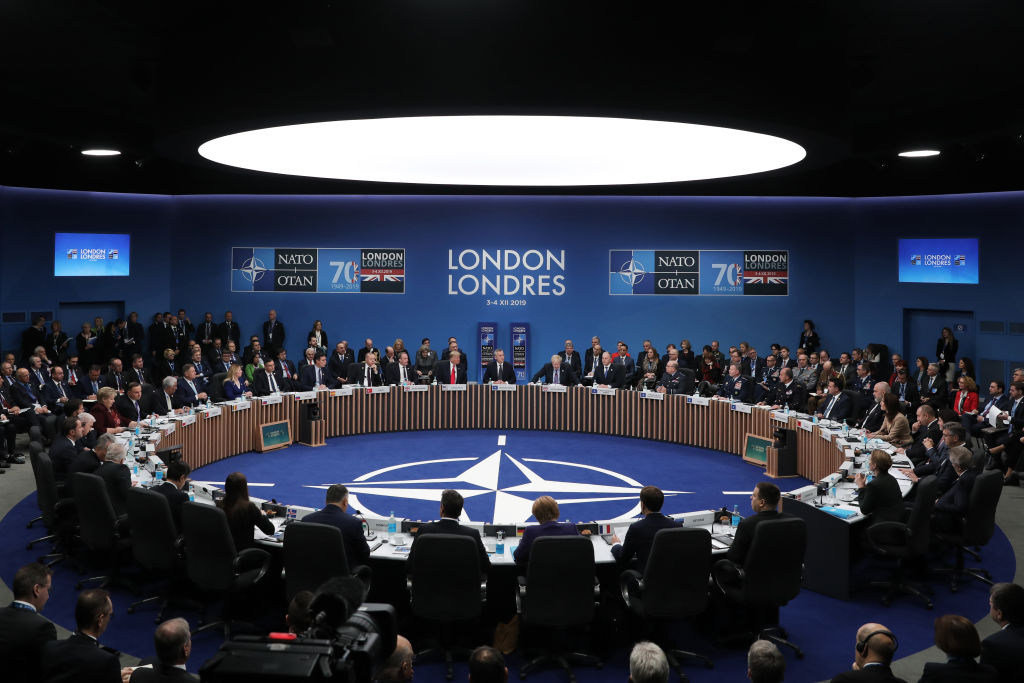 If there is one clear lesson to be drawn from the NATO summit just held in London to mark the alliance's 70th anniversary, it is that the Europeans, and not Donald Trump, are to blame for many of the divisions that exist between the NATO's 29-member states. Pictured: NATO leaders at the summit on December 4, 2019. (Photo by Dan Kitwood/Getty Images) |
If there is one clear lesson to be drawn from the NATO summit just held in London to mark the alliance's 70th anniversary, it is that the Europeans, and not Donald Trump, are to blame for many of the divisions that exist between NATO's 29-member states.
Prior to the summit, during which leaders of the alliance attended glitzy receptions at Buckingham Palace and Downing Street, much of the focus centred on the American president and persistent fears that he might carry out his threat to withdraw the US from the alliance.
Mr Trump's unhappiness with NATO is well-documented, and dates back to the NATO summit in Brussels in July 2018 when, during a testy exchange over the failure of most European member states to pay their fair share towards NATO's running costs, Mr Trump made a direct threat to withdraw the US from the organisation.
It still remains the case that, despite Mr Trump's hectoring on the subject, a significant number of European powers -- most notably Germany, Italy and Spain -- fail miserably to meet the defence spending target of 2% of GDP, which is the minimum requirement for NATO membership. In all three cases, their contributions are just above 1%, which lends credence to Mr Trump's accusation that American taxpayers are footing the bill to ensure the security of feckless Europeans.
Mr Trump's campaign to shame the Europeans into paying more does, though, appear to have had some impact, to the extent that Jens Stoltenberg, NATO's Secretary General, was able to announce in London that recent increases in defence expenditure by Canada and some European states, such as Britain, had so far added an extra $130 billion to NATO's defence budget, with the figure set to rise by $400 billion by 2024, a significant increase by anyone's standard.
As Mr Stoltenberg remarked when announcing the increases, Mr Trump deserved credit for "showing leadership on defence spending" that was having a real impact.
That is not to say Mr Trump has relaxed his attitude on the continuing failure of other European members of the alliance to meet their spending obligations. At a press conference held prior to the commencement of the summit, Mr Trump accused countries that failed to meet their spending obligations as being "delinquent", and complained: "It's not right to be taken advantage of on NATO and also then to be taken advantage of on trade, and that's what happens. We can't let that happen."
While getting NATO's finances in order clearly remains a pressing priority for the Trump administration, the real divisions at the summit have been caused by the conduct of the Europeans, most notably France and Turkey.
Mr Trump was particularly incensed by French President Emmanuel Macron's recent comment, made in an interview with the Economist magazine, that NATO was "strategically brain dead", a remark made in reference to Mr Trump's decision in October to withdraw US forces from northern Syria without first informing his other NATO allies. The American withdrawal allowed Turkish forces to launch a military offensive against Syrian Kurds who had formerly been key allies in the US-led coalition to defeat ISIS.
Turkey's recent decision to purchase Russia's S-400 anti-aircraft missile system, which was designed specifically to shoot down NATO warplanes, has been another serious bone of contention at the summit.
Turkey's important geographical location means that NATO leaders have previously been reluctant to sanction Ankara for its increasingly pro-Russian outlook, which is very much at odds with NATO's position that Russia poses the most significant threat to the alliance's security.
Many NATO countries, however, believe that Turkish President Recep Tayyip Erdogan's decision to buy sophisticated military hardware from Moscow is a step too far, that NATO should respond by imposing measures against the Turks.
The deepening divisions within the alliance have certainly taken the gloss off of the 70th anniversary celebrations in London, to the extent that countries like Russia, that actively desire NATO's demise, will be rubbing their hands with glee.
Con Coughlin is the Telegraph's Defence and Foreign Affairs Editor and a Distinguished Senior Fellow at Gatestone Institute.


